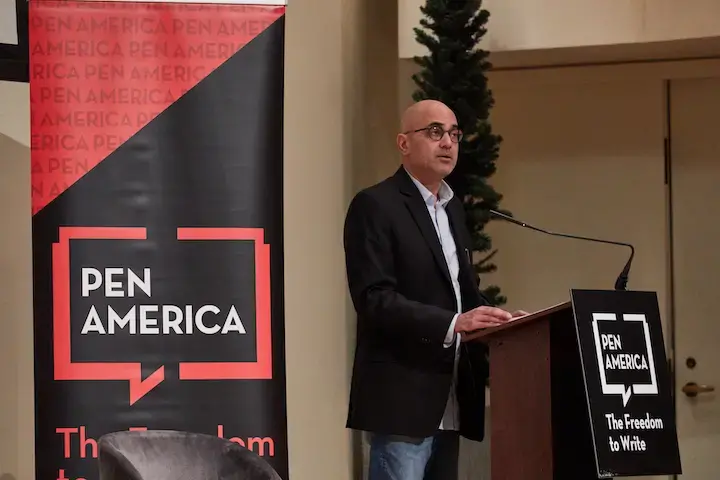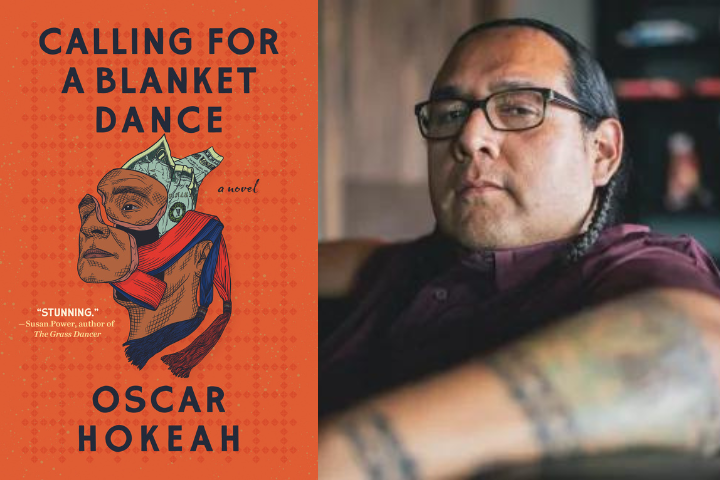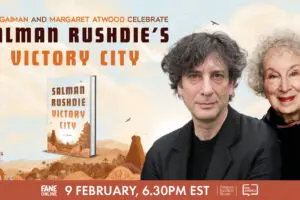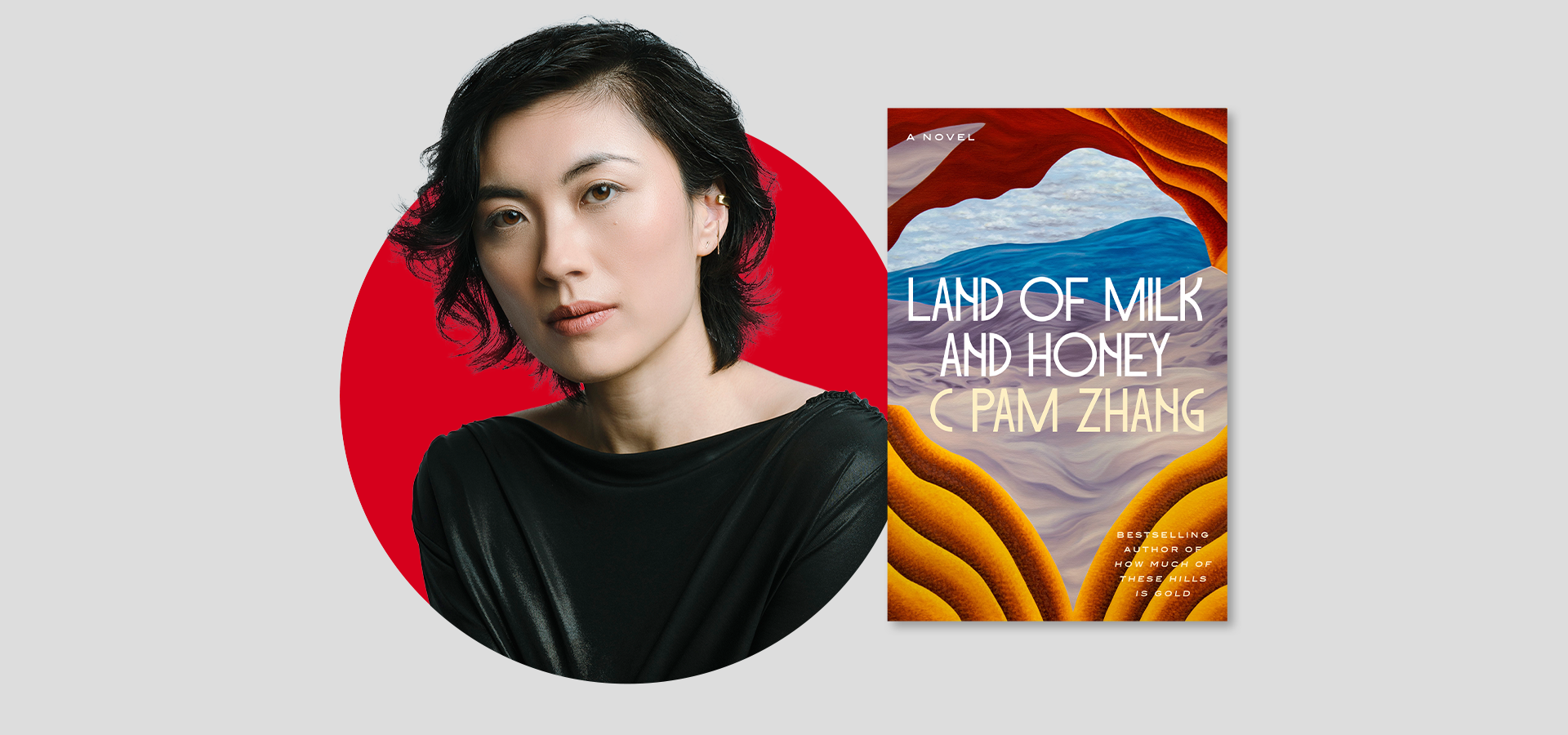
C Pam Zhang | The PEN Ten Interview
September 26, 2023
C Pam Zhang’s Land of Milk and Honey (Riverhead, 2023), offers an incisive look at the world we live in. In a future ravaged by climate disaster, an unnamed Chef takes a job cooking for an isolated mountaintop community of the global elite. As much a mirror to global inequality as an ode to food, pleasure and desire, Zhang’s novel sings as it follows the Chef on a journey to reclaim her hunger after the world has stripped it away.
In conversation with World Voices Festival Associate Director, Sabir Sultan for this week’s PEN Ten, C Pam Zhang discusses food writing, work under capitalism, Top Chef, and the way the rise in anti AAPI hate influenced her novel. (Barnes & Noble, Bookshop)
1. Throughout Land of Milk and Honey there are references to Greek mythology, fairy tales, and biblical stories. From the Garden of Eden, to the Greek myths of Cupid and Psyche and the myth of Persephone, to the novel’s unnamed narrator, the writing is evocative of the strangeness and familiarity of fable. What drew you to writing in this mythopoeic tenor? Were there specific stories you had in mind as you were writing this novel?
Realism seems insufficient for our times. The scope of our possible annihilation as a species, as well as the god-like powers of genetics and AI, feel impossible to grasp within realism as it’s done in the English canon. So: myths.
Years ago, I read Alicia Ostriker’s poem, “Demeter to Persephone,” which places the relationship between goddess and daughter in a modern context. That’s been lodged in my brain ever since. “Get in the car I said /and then it was spring.” Persephone personifies our fear of the death of all that is good and green in the world, and the agony that so many modern parents face over what kind of planet they will pass down to their children. The myth offers the consolation that tragedy, as well as rebirth, are cyclical.
2. The novel’s protagonist, the unnamed Chef, applies for and accepts a job cooking for a community of the uber-rich who have retreated to a gated community on a mountain top in Italy. In a Faustian bargain, her employer, also unnamed, limits her travel, watches her weight and health, and determines the menus for each of the meals she cooks. In turn the Chef has access to produce and meat the rest of the world no longer does and can breathe clean air. What does it mean to cede control for the Chef? Her cooking, her body, her livelihood are all in the control of her employer. What is left?
To live in a capitalist society is to bargain up parts of oneself in order to survive. This is so habitual it often goes unremarked upon. Very few people behave the same way at home and at work. Women, especially, go into the workplace adjusting their behavior, dress, and language in order to enhance their perceived value in the marketplace. I put my chef into an extreme context in which the calculations and hypocrisies of performance are exaggerated to the point of absurdity, and thus laid bare. I’m interested in observing, without judgment, where each individual draws their line–which parts they allow to be taken until they reach some core of self and say: no more, this is who I am.
“I put my chef into an extreme context in which the calculations and hypocrisies of performance are exaggerated to the point of absurdity, and thus laid bare.”
3. The book’s title references the book of Exodus (Exodus 3:8), which refers to the promised land of Judaism as “a land flowing with milk and honey.” Why name this community of the global elite a promised land. To whom is it promised? Who will reap the benefits?
I’m deeply jealous of anyone who can keep a form of faith. That might mean religion, but it might also look like the evangelism and fervor of scientists, or tech workers, or right-wing politicians, or artists. Faith on a larger scale is often wielded cynically. In my novel, the wealthy believe, on some level, that they exemplify the Christian values of people who deserve a land of milk and honey. Yet some of them also use this religious carrot as bait. Many of us toggle between the desire to believe in something, and the skepticism of living in an age of over information. We’re sadly susceptible to scams.
4. Cooking in a world reft of resources, the Chef’s tastes have turned and she wonders if she has lost her appreciation for food. Yet, on her first assignment in the community she is tasked to make a dessert with strawberries and the touch, smell and flavor of them opens her up to memory and desire; “Strawberries and spring, strawberries and musk, strawberries and sex flooded back as I crushed my tongue to sugar. I’d come to that country hardly daring for bitter green and here, now, this rupturing sweetness.” What do you see as the relationship between taste and memory?
Taste is time travel.
“Many of us toggle between the desire to believe in something, and the skepticism of living in an age of over information.“
5. Your descriptions of flavors, eating and tasting are sensual and voluptuous. You capture the pleasures of eating with eroticism. What led you to approach writing about food in this way?
Good sex writing and good food writing locate eroticism within restraint. My favorite passages in this novel do not attempt to describe meals in exhaustive detail; they evoke just enough that the reader will lean in and fill in the gaps with their own memories. It’s a kind of literary seduction, and a lesson I took from the spare, elegant food writing of M. F. K. Fisher.
6. The meals the Chef’s employer tasks her with cooking often serve purposes outside of sustenance and taste. They are tools to persuade the rich residents of the community to invest more funds into the community projects. Food is used to manipulate them through memory and ego and even through the appeal of exclusivity. With that context what was your favorite meal you came up with in the novel?
The first dinner party in which the chef eats with her diners. The main course turns my stomach, but there was deliciousness in having the uber wealthy gobble up something so foul. It makes clear, and ridiculous, that food for them is about status.
7. As resources become more limited in the world of the novel, we see a rise in nativism, with tribalism and racism flourishing – there are chants of “Italy for Italians” and America closes its borders and counts how many generations of a person’s family have lived in the US as a criteria to determine ranking for reentry to the States. How did you plot out this acceleration in xenophobia? Did you look to recent and historical events as precedents?
Recent outcry in the US against so-called chain migration was on my mind, as were the anti-Asian hate crimes that followed the racist labeling of the coronavirus as the “Chinese Virus” and “Kung Flu.” The latter hit me especially hard. In the smallest of small towns in America, the restaurant you find after the burger place and the pizza place is often the Chinese American place. Yet love of Chinese food didn’t protect actual Chinese bodies from violence. Xenophobia, I can comprehend on some abstract level. Xenophobia matched with a desire to consume products made by those very people you claim to despise–that’s a paradox I could spend a lifetime pondering.
8. In your acknowledgements you thank, among others the TV show Top Chef, and “especially winners Melissa King and Mei Lin, and host Padma Lakshmi.” What did these women specifically mean to you?
Top Chef was my entry point into the world of Western fine dining. As a poor college student, I’d sit in front of my laptop, eating my dining hall slop, imagining what those dishes might taste like. The narrative of food hooked me before the taste of food. My culinary education a la Top Chef armed me with the curiosity and confidence to eat more widely once I had the money.
My relationship with Top Chef changed as I developed my own opinions on what I was eating, and how it was valued. I began to chafe at the ways in which Top Chef often reflected the imperialist beliefs of the culinary world. For example, a challenge in which contestants must cook a classical French dish that is not explained. Chefs of color, and chefs from impoverished backgrounds, often struggled not because of a lack of ability, but because of a lack of access to an elevated Western European cuisine deemed canonical. Or chefs would be criticized for food that was too spicy–according to whose palate? As I acquired my own tastes, Top Chef became an interesting and instructive barometer.
It’s been wonderful to watch Top Chef change along with the culinary conversation. The show is more global in its outlook, and, frankly, much more interesting–which I credit, in part, to people like Padma Lakshmi, Mei Lin, and Melissa King. I will forever be a fan, and still dream about hosting a Quickfire challenge one day–but I’d get a kick out of having the contestants cook with, like, fermented fish and Spam.
“Like language, food is essential and theoretically accessible to almost anyone. The real question is which culinary voices are permitted, celebrated, amplified, valued.“
9. Who are some of your favorite food writers?
M. F. K. Fisher, Helen Rosner, Ligaya Mishan, Soleil Ho, Ruth Reichl. In fiction, Banana Yoshimoto, Sarah Thankam Mathews, Stephanie Danler, Bryan Washington, and Brian Jacques can turn out an exquisite food scene.
The seed of this book may lie in Frances of Bread and Jam for Frances, who weeps over the ennui of getting exactly what she wants, only to want it no longer.
10. How do you see food as a form of expression as it relates to free expression?
Like language, food is essential and theoretically accessible to almost anyone. The real question is which culinary voices are permitted, celebrated, amplified, valued.
Born in Beijing, C Pam Zhang is mostly an artifact of the United States. She is the author of How Much of These Hills Is Gold, winner of the Academy of Arts and Letters Rosenthal Award and the Asian/Pacific Award for Literature; nominated for the Booker Prize; and a finalist for the PEN/Hemingway Award and a Lambda Literary Award. Zhang’s writing appears in Best American Short Stories, The Cut, McSweeney’s Quarterly, The New Yorker, and The New York Times. She is a National Book Foundation 5 Under 35 Honoree.
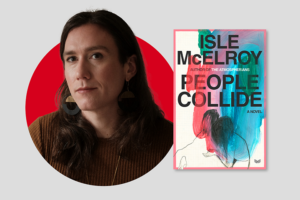
Isle McElroy | The PEN Ten Interview
It can feel amazing to be taken care of, to be known, but it can also feel limiting if one is shown things about oneself that are difficult to confront.
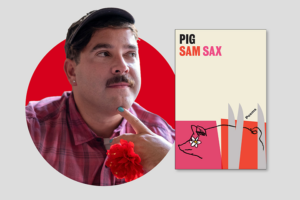
Sam Sax | The PEN Ten Interview
I think in that same way that every poem teaches you how to read it, every poem you make teaches you how to make it as you’re writing.
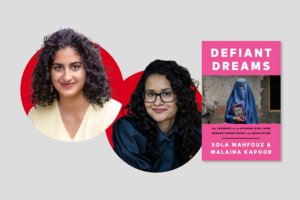
Sola Mahfouz & Malaina Kapoor | The PEN Ten Interview
In Afghanistan, laughter is as much a part of life as sorrow and pain. People crack jokes while hiding from bombs in basements, finding humor in their grim reality.
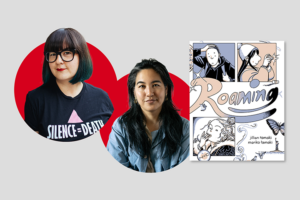
Jillian Tamaki & Mariko Tamaki | The PEN Ten Interview
Your first big break up, the first loves of your life, are your friends. Those stories are really interesting, meaty stories.

